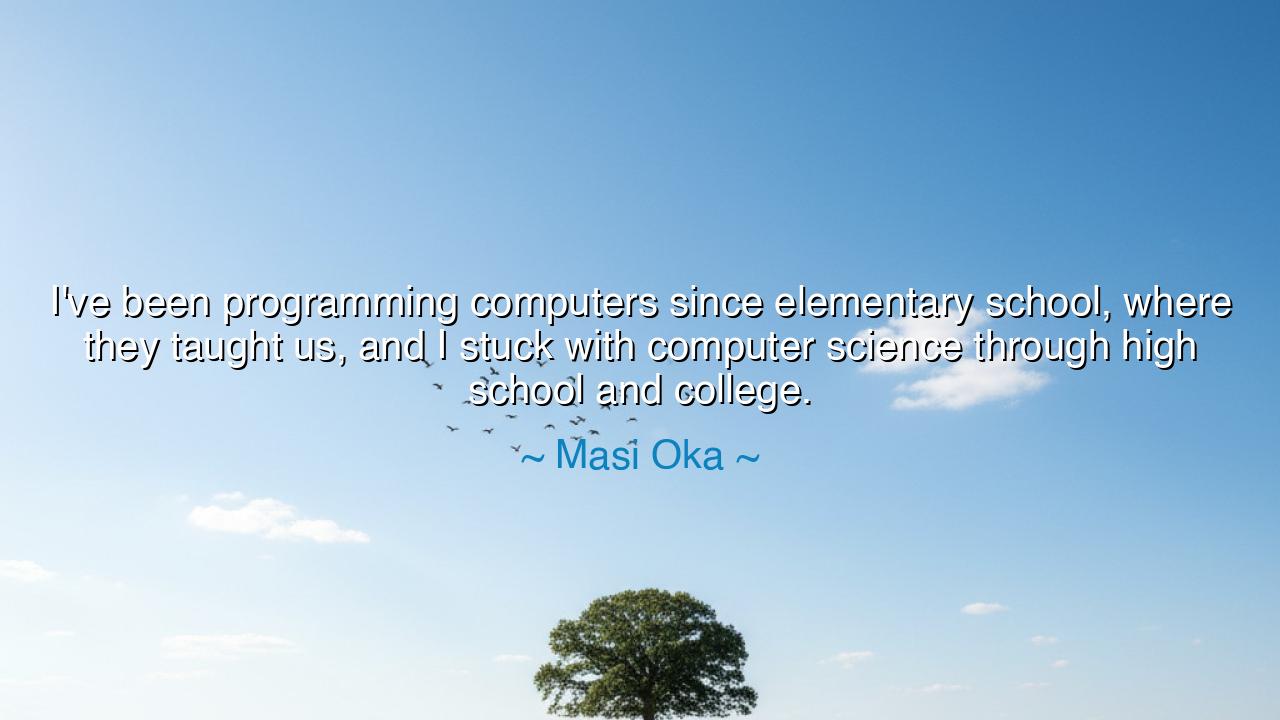
I've been programming computers since elementary school, where
I've been programming computers since elementary school, where they taught us, and I stuck with computer science through high school and college.






“I’ve been programming computers since elementary school, where they taught us, and I stuck with computer science through high school and college.” Thus spoke Masi Oka, the actor, technologist, and visionary, whose life stands as a bridge between creativity and computation. In these humble words, Oka reveals not merely the story of a career, but a testament to the power of persistence, curiosity, and discipline. For his statement is not about machines, but about the soul of a human being who has learned to grow alongside them — to wield the tools of his age without losing the wonder of the child who first touched them.
In the ancient days, mastery was born not in the rush of success but in the steadiness of devotion. The sculptors of Greece, the inventors of Alexandria, and the scholars of the Middle Ages all shared this same truth: that to learn deeply, one must remain faithful to the craft through the long seasons of study. Masi Oka, though living in the era of silicon and code, embodies this same eternal discipline. His words — “I stuck with computer science through high school and college” — are simple, but they carry the quiet heroism of one who has endured the long apprenticeship that mastery demands. In a time when attention is fleeting and interest fades like mist, his steadfastness becomes a modern parable.
As a child of the digital dawn, Oka began his journey when computers were still young — strange machines of logic and light, demanding both precision and imagination. To him, programming was not mere calculation, but a dialogue between human thought and artificial creation. Each line of code was like a verse in a poem, a structure of logic that could make lifeless metal sing with purpose. His perseverance through years of study reflects an ancient truth in modern form: that the tools may change, but the spirit of the learner does not. To “stick with it” is the timeless act of turning curiosity into skill, and skill into wisdom.
Consider the tale of Leonardo da Vinci, that Renaissance soul whose curiosity knew no bounds. He studied anatomy, geometry, painting, and the mechanisms of flight — never content with surface knowledge. Like Oka, Leonardo did not chase after novelty; he cultivated continuity. His genius was born not of sudden inspiration, but of decades of persistence, of learning, failing, and trying again. Oka’s path, though walked in the digital age, mirrors Leonardo’s in spirit. For both men, mastery grew from the same soil: the patient tending of one’s craft, year after year, until the boundary between art and science dissolves.
Oka’s words also reveal a profound respect for education as the foundation of destiny. He honors those early teachers who first introduced him to programming, for they lit a spark that would carry him through the corridors of time. The ancient philosopher Confucius once said, “Education breeds confidence. Confidence breeds hope. Hope breeds peace.” Oka’s journey is a living echo of this truth. The lessons of his youth were not mere lessons in technology, but lessons in perseverance — the realization that mastery is not achieved in a moment, but sustained by the will to continue.
Yet there is another layer to his wisdom. In an age obsessed with immediate success, Oka’s story reminds us that true accomplishment begins in quiet beginnings. The child who writes code in a classroom may one day shape the tools that change the world. The student who struggles through logic and syntax may later create art, medicine, or music through the power of the machine. His life reminds us that greatness is not born in grand gestures, but in the consistency of small acts repeated over time. To learn deeply, to remain faithful, to grow steadily — this is the path of all who would master both mind and matter.
So, O seeker of wisdom in the modern age, take this teaching to heart: begin early, and stay true. Whatever your craft — be it art, science, or service — nurture it with the same devotion that Masi Oka gave to his code. Do not flee when progress feels slow, for patience is the forge of skill. Do not despise your beginnings, for from humble classrooms come mighty architects of the future. Let your curiosity become your compass, your persistence your guide, and your education the foundation of all that follows.
For in Oka’s simple reflection lies a profound truth: technology changes, but mastery endures. The tools of today may fade, but the disciplined mind remains eternal. Therefore, learn as the ancients did — with reverence, with endurance, and with joy — and in time, your work, too, will become a bridge between what is human and what is possible.






AAdministratorAdministrator
Welcome, honored guests. Please leave a comment, we will respond soon